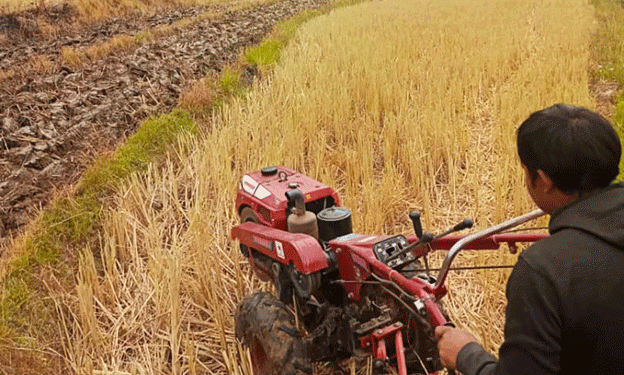In Punakha, Bhutan, a groundbreaking agricultural initiative is taking place, as Jola Enterprise pioneers the country’s first large-scale commercial wheat farming project. Launched in October 2024, the venture involves cultivating wheat on a 28-acre paddy field in Habesa village, located in Chhubu gewog. This project not only represents a shift in Bhutan’s agricultural landscape but also seeks to address pressing issues like wheat import dependency and underutilized agricultural land.
Jola Enterprise is led by a team of highly experienced individuals, including Pema Dakpa, an expert in agricultural engineering and food technology, and Kinley Dorji, an agriculturalist with extensive experience in the Agriculture Extension Division. They are joined by Norbu, a mycologist specializing in mushroom cultivation, and Nima, a business professional overseeing financial and procurement operations. Together, they bring a wealth of expertise in crop production, business financing, food processing, and agricultural technology.
Aims and Goals of the Project
The primary goal of this venture is to reduce Bhutan’s dependence on wheat imports, which currently amount to over Nu 328 million annually. By cultivating wheat on post-paddy wetlands, the team hopes to maximize the productivity of land that would otherwise remain fallow. Kinley Dorji, one of the project leaders, expressed the broader vision of the project: “Wheat cultivation at this scale is a first for Bhutan. With support from local farmers and stakeholders, we aim to establish a sustainable wheat flour industry in the country.”
This endeavor also offers a comprehensive agricultural solution. Jola Enterprise supplies and maintains various farming technologies, including cold storage facilities, greenhouses, and irrigation systems, while also running turnkey projects focused on indoor mushroom cultivation and farm automation. These efforts are designed to integrate advanced agricultural practices into Bhutan’s farming ecosystem.
Challenges and Economic Impact
While the project has seen remarkable success in its early stages—completing cultivation within just 13 days in November 2024—challenges remain. High cultivation costs, including power tiller rentals, fertilizer, seeds, and crop protection services, pose significant hurdles for the initiative. Despite these costs, the project is already having a positive economic impact on the local community. 115 local farmers and power tiller operators were employed during the process, creating valuable jobs and stimulating the local economy.
The project also benefits other agricultural stakeholders, such as the National Seed Center, which found a market for its products through seed purchases. Furthermore, Jola Enterprise has emphasized the importance of collaboration with farmers and support from the government to expand wheat cultivation in the coming years.
Wheat Production Trends in Bhutan
Bhutan’s wheat production has been on the decline in recent years. According to the Integrated Agriculture and Livestock Census of Bhutan 2023, the country produced only 837 metric tons (MT) of wheat in 2023, a sharp decline from the 1,319 MT produced in 2019. This decline is part of a broader trend in the country’s agricultural sector, which has struggled with low productivity, climate challenges, and rising dependency on imports. Last year, Bhutan imported over 8 million kilograms of wheat flour from India, worth approximately Nu 328 million.
By focusing on large-scale wheat production, Jola Enterprise hopes to reverse this trend. The company aims to establish a local wheat flour industry that would reduce Bhutan’s wheat import bill significantly.
Conclusion: A Bright Future for Bhutan’s Wheat Farming
The initiative by Jola Enterprise marks a significant turning point in Bhutan’s agricultural landscape. By cultivating wheat on a large scale, the team is setting the foundation for self-sufficiency in wheat production and contributing to the country’s overall food security. However, the success of this project hinges on overcoming economic challenges and securing sustained government support. If successful, this venture could drastically reduce Bhutan’s reliance on wheat imports and foster a more resilient agricultural sector.
With continued collaboration between the private sector, local farmers, and government agencies, this initiative has the potential to revolutionize Bhutan’s wheat farming industry and secure a more sustainable agricultural future for the nation.
Error




